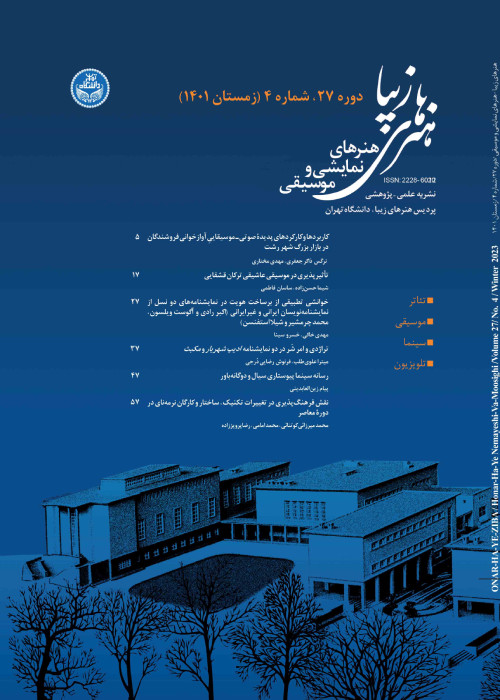The Importance of Memories in the Characters of Naghmeh Samini’s Plays by Focusing on Sleeping in Empty Cups, Echolocation, and The Language of Wild Raspberries*
Plays represent life stories both through narration and performance. Theatrical literature evokes memories in such a way that these stories become persistent in the stream of consciousness of the audience. This paper seeks to explore the concept of memory with the analysis of characters from three plays: Sleeping in Empty Cups, Echolocation, and The Language of Wild Raspberries by female playwright Naghme Samini. These plays and their structures are evaluated to address the importance of memory for the characters by using a descriptive-analytical research method. In each case study, the main characters of the play are explored based on their behavior and dialogues, with a focus on the concept of collective memory. In this context, collective memories are defined as events that are remembered by a group of people who are involved in building and shaping that memory. The more people remember and recall a shared memory, the greater is the semantic and collective burden of that memory. The case studies are evaluated based on different criteria. One is the main subject of the story and the time that events of the play are happening. Another aspect considered in the three plays is the influence they have on the audience. Characteristics of the leading roles and their behavioral patterns are other factors that were considered in comparison of the three plays. The first case study, Sleeping in Empty Cups, happens in a historical era (Qajar dynasty) and therefore, evokes memories from the past through many references to the social environment of the time. In this play, the audience is encouraged to compare social issues of that era with the challenges of contemporary society. Within the second play, Echolocation, two main eras of the modern history of Iran are compared: before and after the revolution of 1978. Dialogues and events of this play recall many political incidents of the time, but it also includes many symbolic references to ancient myths. The play represents the conflicts between two eras, as well as the oppositions among different characters. The Language of Wild Raspberries is a play that could be categorized as a surreal work that represents many ambiguous concepts both in form and in content. The main events of the play take place in the present, but the story repeatedly moves forward and backward in time. This structure evokes many memories through detailed symbols which are referred to by the characters. The results of this comparative study with these three plays indicate that characters have more significant effects on evoking the audiences' memory through narrations and the creative juxtaposition of the storyline within the dialogues. Among these case studies, The Language of Wild Raspberries has the most influence in terms of persistence in memory. Although the play is a narrative of contemporary life, it contains many details in dialogues, especially by the male character. In all three plays -and mostly in The Language of Wild Raspberries - memories are made and recalled through different time and spatial factors, as well as socio-cultural and perceptional factors.
- حق عضویت دریافتی صرف حمایت از نشریات عضو و نگهداری، تکمیل و توسعه مگیران میشود.
- پرداخت حق اشتراک و دانلود مقالات اجازه بازنشر آن در سایر رسانههای چاپی و دیجیتال را به کاربر نمیدهد.


